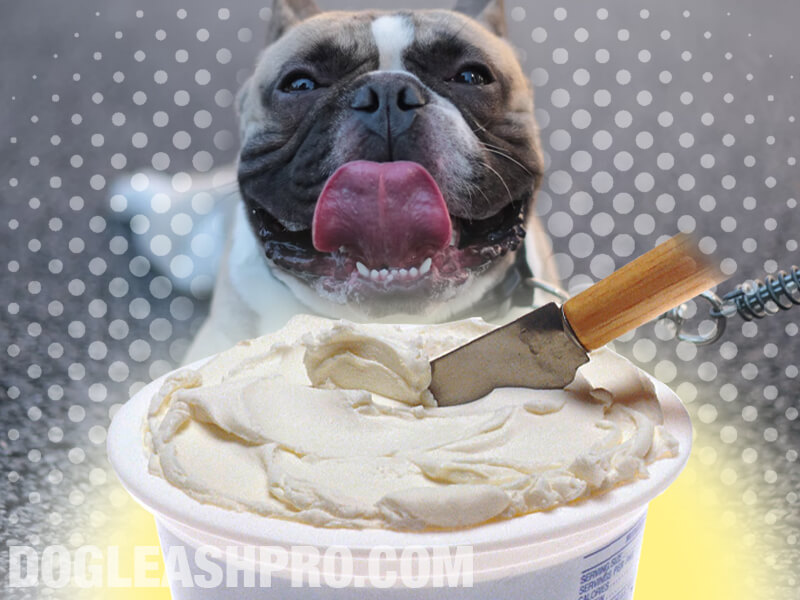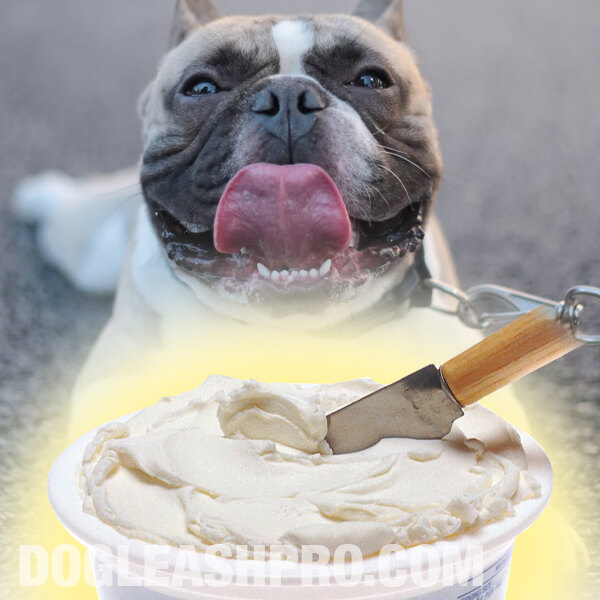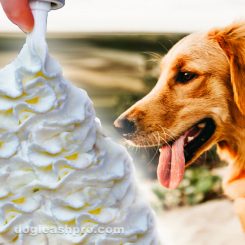
You’re probably using Cream Cheese or other types of cheese when your dog comes running into the kitchen and quickly licks a chunk of Cream Cheese off the spoon. As he is begging for more, you stop and ask yourself, “Can a dog have Cream Cheese?” Here’s the short answer first before we dig deeper into the details.
Can dogs eat Cream Cheese? Yes, dogs can eat Cream Cheese in small portions since it is not toxic to them. However, Cream Cheese is high in calories and fat. Before feeding your dogs Cream Cheese, make sure they’re not lactose intolerant. Stick to plain Cream Cheese for dogs and avoid ones added with garlic, onion, or chives as those are poisonous to dogs.
Table of Contents
Can dogs have Cream Cheese?

Yes, dogs can have Cream Cheese in small portions and as a rare treat. Before you feed your canine friends Cream Cheese, you’ll want to make sure they are not lactose intolerant first, which we’ll discuss in detail below.
Also, if your pooch is on weight management, then it’s not a good idea to feed them Cream Cheese since it has a high calorie and fat content.
A dog’s natural diet should be nutritious and well-balanced in order to keep him or her healthy and active. That means a balanced diet of protein, fat, and carbs.
So, how much Cream Cheese can a dog have? Since Cream Cheese isn’t essential to your furry friends’ health and it’s not a natural food for them, dogs should only have a small portion of Cream Cheese. It should only be a rare treat or given to your pooch occasionally.
Can my dog eat Cream Cheese?
The quick answer is yes, your dogs can eat Cream Cheese, but it may not be a good idea. That’s because while plain Cream Cheese isn’t poisonous to dogs, its nutritional profile isn’t the healthiest for dogs.
In some ways, Cream Cheese can be bad for dogs. Let’s discuss that next.
Is Cream Cheese bad for dogs?
Yes, Cream Cheese can be bad for dogs. Let’s take a look at the nutritional profile of just 1 tablespoon or 14.5 grams of Cream Cheese to learn why.
Nutritional Profile of Cream Cheese (1 tbsp or 14.5 grams)
| Name, Unit | Amount |
| Calories, cal | 50.8 |
| Sugar, g | 0.545 |
| Lactose, g | 0.545 |
| Sodium, mg | 45.5 |
| Carbohydrate, g | 0.8 |
| Total Fat, g | 4.99 |
| Protein, g | 0.892 |
| Calcium, mg | 14.1 |
| Iron, mg | 0.016 |
| Magnesium, mg | 1.3 |
| Phosphorus, mg | 15.5 |
| Potassium, mg | 19.1 |
| Zinc, mg | 0.072 |
| Copper, mg | 0.003 |
| Manganese, mg | 0.002 |
| Selenium, µg | 1.25 |
| Thiamin, mg | 0.003 |
| Riboflavin, mg | 0.033 |
| Niacin, mg | 0.013 |
| Vitamin B-6, mg | 0.008 |
| Folate, µg | 1.3 |
| Vitamin B-12, µg | 0.032 |
| Vitamin A, µg | 44.7 |
| Beta carotene, µg | 8.56 |
| Vitamin E, mg | 0.125 |
Cream Cheese contains lactose which is harmful to dogs that are lactose-intolerant
There are 0.545 grams of lactose in just 1 tablespoon or 14.5 grams of Cream Cheese. Lactose is the sugar that’s found in milk.
Even without looking at the nutritional profile, we know that Cream Cheese is a dairy product and is harmful to dogs that are lactose-intolerant.
Most adult dogs are lactose intolerant because sometime after they’ve weaned and start to eat solid food, they no longer produce their own lactase, which is an enzyme that breaks down the lactose sugar in milk.
Since the dog’s body isn’t able to break down the lactose sugar in milk, he isn’t able to absorb it and as a result, he may start to have an upset stomach, diarrhea, bloating, flatulence, loss of appetite, and even vomiting. These are signs of lactose intolerant.
If this is the first time you’re giving your pooch Cream Cheese, give him a tiny amount and check for any negative reactions. If your dog starts to experience the above-mentioned symptoms, then he is lactose intolerant and you should not give him any more Cream Cheese.
If you’re not sure, we highly recommend that you consult your dog’s vet and find out if he can handle dairy products before feeding him Cream Cheese.
Cream Cheese is high in fats which can lead to canine obesity
There are 4.99 grams of fat in just 1 tablespoon or 14.5 grams of Cream Cheese. Consuming food that is high in fats regularly is unhealthy for dogs and can lead to weight gain and eventually canine obesity or even acute pancreatitis.
When dogs are obese, they may be at risk for a whole host of other health issues such as:
- Hypertension.
- Diabetes.
- Heart disease.
- Different types of cancer.
- Urinary bladder stones.
- Osteoarthritis.
- Joint pain.
Cream Cheese is high in calories which is not good for dogs
Cream Cheese is also high in calories and this is harmful to dogs. There are 50.8 calories in just 14.5 grams or 1 tablespoon of Cream Cheese.
Dogs should have about 25 to 30 calories per pound every day to maintain a healthy weight.
If we have two dogs, one small and one medium-sized, then that means:
- A small 10 pound Chihuahua needs 250 calories a day.
- A medium-sized 70 pound Labrador needs 1,750 calories a day.
Keep in mind that doggy treats should only be 10% of your K9 friend’s daily calorie intake.
This means your Chihuahua can have 25 calories from treats and your Labrador can have 175 calories from treats. Giving your Chihuahua just 1 tablespoon of Cream Cheese would be too much for him because it will be twice his calorie intake limit for treats.
If we regularly feed our 10-pound Chihuahua 1 tablespoon of Cream Cheese, then he is at risk of canine obesity and this can lead to several health issues we discussed above.
You might be interested in: Chihuahua Health Issues – Complete Guide
Cream Cheese is high in salt which can cause sodium poisoning in dogs
There is 45.5 mg of sodium in just 14.5 grams or 1 tablespoon of Cream Cheese. Keep in mind that dogs should only have around 0.25 to 1.5 grams of salt for every 100 grams of food.
Our four-legged friends should also receive their salt intake from their regular dog food and not from treats or snacks.
Consuming too much salt or eating more a lot of Cream Cheese puts your pooch at risk of salt poisoning. Signs of salt poisoning include:
- Extreme thirst causes dogs to drink a lot of water.
- Urinating more often than before.
- Loose diarrhea.
- Vomiting.
- Lack of coordination.
- Unable to move or walk correctly.
- Loss of appetite.
- Convulsions.
- Muscle tremors.
- Body weakness.
- Lethargy.
Is Cream Cheese safe for dogs?
As we can see, Cream Cheese is only safe for dogs if you know your furry family members are not lactose intolerant and are relatively healthy.
Is Cream Cheese toxic to dogs? No, Cream Cheese is not toxic to dogs, but since it is a dairy product that is high in salt, fat, and calories, it can be harmful to them.
Dogs that are on weight management due to being overweight or obese, have arthritis, heart disease, or diabetes should stay away from Cream Cheese.
So, is Cream Cheese ok for dogs? Yes, Cream Cheese is ok for dogs in small portions and as a rare treat or as an occasional treat.
Is Cream Cheese good for dogs?
In some ways, yes, Cream Cheese is good for dogs in moderation and in small portions.
That’s because Cream Cheese is packed full of vitamins and minerals that are beneficial to your dogs’ health such as calcium, iron, magnesium, potassium, folate, and vitamins A, B, and E to name a few.
However, your four-legged friends can receive these nutrients from their regular doggy diet or dog-friendly treats.
While Cream Cheese does provide some nutrients to dogs, it’s still best to offer our furry family members Cream Cheese as an occasional or rare treat.
Are dogs allergic to Cream Cheese?
Generally, dogs that are lactose intolerant, allergic to Cream Cheese, or sensitive to it may experience the following symptoms:
- Upset stomachs.
- Constipation.
- Diarrhea.
- Flatulence.
- Going to the bathroom more often than before.
- Ear infections.
- Skin infections.
- Excessive scratching or licking of itchy skin.
If your dogs are experiencing the above symptoms, it’s best to call your vet right away.
Can dogs eat Philadelphia Cream Cheese?
Yes, dogs can eat Philadelphia Cream Cheese in moderation and in small amounts since the ingredients in this Cream Cheese are not toxic to dogs. Many people enjoy Philadelphia Cream Cheese as it is one of many popular brands of Cream Cheese.
Be sure that your pooch is not lactose intolerant before allowing him or her to lick the spoon filled with Philadelphia Cream Cheese. You can give your pooch a tiny amount as a rare treat.
Can dogs eat Cream Cheese spread?
Yes, dogs can eat Cream Cheese spread in small portions and in moderation. Keep in mind that the Cream Cheese spread was made for human consumption and not for doggy consumption.
If you plan to offer your canine family member a small amount of Cream Cheese spread, make sure it is plain without any added flavors like sugar, onions, garlic, chives, or spicy peppers.
Can dogs eat whipped Cream Cheese?
Yes, dogs can eat whipped Cream Cheese in small amounts and in moderation.
Before you feed your precious pooch whipped Cream Cheese, make sure there’s no added sugar in it as too much sugar consumption can lead to a whole host of health issues in dogs including diabetes, metabolic changes, heart disease, dental issues, weight gain, and even pancreatitis.
You might also like: Can Dogs Eat Whipped Cream?
Can dogs eat strawberry Cream Cheese?
Yes, dogs can eat strawberry Cream Cheese in small portions and as a rare occasional treat.
Can dogs have strawberry Cream Cheese? Yes, dogs can have strawberry Cream Cheese in small portions. However, before you give your K9 pals strawberry Cream Cheese, you’ll want to take a look at the ingredients first and make sure it doesn’t contain any added sugar or artificial ingredients and sweeteners like xylitol.
Xylitol is extremely toxic to dogs.
If you can, we highly recommend making homemade strawberry Cream Cheese that is canine-friendly. Since strawberries are safe for dogs to eat, you can puree some fresh strawberries with plain Cream Cheese.
Since strawberries do contain natural sugar, you’ll want to only give your dogs small portions of homemade strawberry Cream Cheese as a rare treat.
Check out: Can Dogs Eat Strawberry Jam?
Can dogs eat Cream Cheese and chives crackers?
No, dogs should not eat Cream Cheese and chives crackers. One of the most popular Cream Cheese and chives crackers is Captain’s Wafers Cream Cheese & Chives. If we take a look at the ingredients of Captain’s Wafers Cream Cheese & Chives, we see this:
Captain’s Wafers Cream Cheese & Chives Ingredients
- Enriched Flour: Wheat flour, niacin, reduced iron, thiamine mononitrate, riboflavin, and folic acid.
- Vegetable oil: Palm oil, soybean oil, canola oil.
- Deproteinized dairy whey.
- Sugar.
- Buttermilk.
- Corn syrup solids.
- Leavening: Sodium Bicarbonate, Ammonium Bicarbonate, Monocalcium Phosphate.
- Salt.
- Corn syrup.
- Cream cheese: pasteurized cream, cheese cultures, salt, carob bean gum, and guar gum.
- Sodium caseinate.
- Spices: Chives and parsley.
- Nonfat dry milk.
- Natural and artificial flavors.
- Soy lecithin.
- Peanut oil.
One of the ingredients that are dangerous and poisonous to our dogs in Cream Cheese and chives crackers is chives.
Chives are part of the allium family which also includes leeks, garlic, and onions. When dogs eat Chives, they may have anemia since Chives contain organosulfoxides which can cause damage to the dog’s red blood cells.
For these reasons, it’s best that dogs stay away from Cream Cheese and chives crackers.
Related: To learn more about crackers, check out Can Dogs Eat Crackers?
Can dogs eat Cream Cheese frosting?
No, dogs should not eat Cream Cheese frosting. Can dogs have Cream Cheese frosting? No, dogs should not have frostings of any kind.
That’s because frosting contains high levels of sugar which is not healthy for dogs. Frostings may also contain vanilla from pure vanilla extract.
Vanilla flavoring and extract are poisonous to dogs since it has high alcohol content in them. Our dog’s bodies are not able to digest alcohol properly.
Can dogs eat bagels with Cream Cheese?

No, dogs should not eat bagels with Cream Cheese if they have wheat allergies, are sensitive to gluten, or are lactose intolerant. However, a small piece of plain bagel won’t hurt your pooch if he or she is healthy. Make sure there are no poppy seeds on the bagel.
Since bagels are high in carbs and calories, sticking to a moderate amount or a small piece is best.
My dog ate Cream Cheese! What should I do?
If your dog ate Cream Cheese, observe them closely right after they’ve consumed it and check for any adverse reactions. If your pooch is lactose intolerant or is allergic to wheat and gluten, then they may have flatulence, bloating, diarrhea, or even vomiting.
We recommend consulting your dog’s vet if your dog ate Cream Cheese wrapper or his behavior starts to change such that he starts to act lethargic or has a loss of appetite.
So, can dogs eat Cream Cheese?
Dogs can certainly eat Cream Cheese but dog owners should only give their pooch a small portion and in moderation. Cream Cheese can be used as a rare occasional treat and should not be consumed regularly or daily.
While Cream Cheese is safe for doggy consumption such that it doesn’t contain any ingredients that are toxic to dogs, it’s not the healthiest for dogs either.
If your K9 friends are allergic to dairy products or are lactose intolerant, avoid giving them Cream Cheese and stick to canine-friendly treats and snacks.
DISCLAIMER: THIS WEBSITE DOES NOT PROVIDE MEDICAL ADVICE
The information, including but not limited to, text, graphics, images and other material contained on this website are for informational purposes only. No material on this site is intended to be a substitute for professional veterinary advice, diagnosis, or treatment. Always seek the advice of your veterinarian or other qualified health care provider with any questions you may have regarding dietary needs.
Resources:
https://en.wikipedia.org/wiki/Cream_cheese
https://vcahospitals.com/know-your-pet/adverse-reactions-to-food-in-dogs

With over five years of specialized experience as an animal writer, my expertise lies in dog nutrition, health, behavior, grooming, and training. I am dedicated to delivering helpful and informative content that caters to the well-being of our furry friends. My primary goal is to empower pet owners with knowledge and ensure our canine companions thrive in health and happiness. In my free time, I love volunteering at local dog rescue centers.







